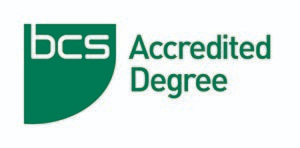
Computer Science with Cyber Security
Full-time
With placement
Three year
Four year
September 2026
In a nutshell
Cyber criminals are using sophisticated techniques to infiltrate I.T systems and steal valuable data. Help businesses and organisations to fight back by building cyber security knowledge and skills with our Computer Science with Cyber Security degree.
Designed to fill an emerging global skills gap, our fast-growing course will take your interest in computer science and enhance it with a specialist cyber focus. Accredited by the BCS, the Chartered Institute for IT, our course will build your understanding of the inner workings of programmes, operating systems and networks, so you understand how cyber-attacks happen.
As you complete specially designed projects, you will develop the ability to think conceptually, and cultivate independent technical judgement, as you prepare for future cyber security related roles. We’ll ensure you adopt a professional approach, making you aware of laws, regulations and competences needed to work with other IT professionals.
Start your study journey
Register for our next Open Day to learn more about studying computer science with cyber security, explore our facilities and meet the course team
You will:
- Learn how to diagnose attacks and use forensics to determine the extent of damage
- Develop an understanding of cryptography to address security concerns
- Know how to preserve evidence so you can work within an ethical framework
- Build risk management knowledge so you can actively manage threats
options available
students accepted
Course accreditations

This is for you if...
You're passionate about computing and are excited about how to fight cyber crime
You're interested in how things work rather than just wanting to use them
You've got a keen attention to detail, enjoy problem-solving and like to use your initiative
All about the course
Course Delivery
Delivered across three years (or four, if you choose to include an industry placement) our BSc (Hons) Computer Science with Cyber Security degree is designed to develop your in-depth knowledge and understanding of programming, computer systems, data mining, cyber security and network penetration testing.
In your final year you'll take further cyber security focused modules, including cyber investigation and malware and exploit analysis. You'll also complete an individual project that will demonstrate your knowledge and skills
Learn more about the cyber security course modules in the section below.
Learning Experience
Embedding collaboration with industry and working on real-world projects is an essential aspect of studying computer science with cyber security at Salford. In your second year you'll have the opportunity to take part in our three-week long industry challenge, Hackcamp. Working in a team with other second year computer science and cyber security students, you'll develop a web-hosted dashboard or application to meet a real-life brief, set by one of our industry partners. At the end of the three weeks students also have the chance to present their finished project at our Hackcamp showcase day.
Working on real-world set briefs alongside your specialist studies will give you the skills and knowledge you need to prepare for an exciting career in cyber security. You will also bring all of your learning together by completing an individual project in your final year, where you can focus on an area of software engineering of your choice.
Industry Placement
On this cyber security course, you'll have the option to take an industry placement between years two and three. Although you’ll be responsible for securing your own placement, our tutors will support you all the way, from helping you to apply to providing support while you are on placement.
By successfully completing a placement year, you will enhance your graduate employment prospects, and can add 'with placement' to your final degree award.
Database Systems
This module will share fundamental knowledge of database management systems, their design, implementation and applications. It will develop your knowledge and understanding of the underlying principles of relational database management system, and how to implement and maintain an efficient database system.
Computer System Internals and Linux
This module will provide you with an in-depth low-level knowledge of computer systems, concentrating on computer architecture, operating systems and communications technology. You will also start to develop skills in the use of Unix-like operating systems at command-line level, writing and using simple scripts and batch files and the simple system administration of a standalone Linux PC.
Programming 1
You will be introduced to a practical, hands-on approach to programming where workshops will provide focused practical activity on a managed learning curve. You will learn excellent programming practice through design, implementation and testing, and will be introduced to the basics of structured programming language using an integrated programming environment.
Programming 2
You will strengthen your syntax and semantics base of Java developed in the ‘Programming 1’ module. You will develop an appreciation of recursion as well as your knowledge of dynamic data structures. Additionally, you will learn how to test and debug code, along with an appreciation of more sophisticated programming behaviour.
Professional Development and Practices
You will be introduced to the business context and application of computing and information systems. You will explore this through societal, professional, ethical and legal issues surrounding business practices and the theory and process of project delivery to a professional standard.
Web Development and Human Computer Interfaces
You will be introduced to theory and practice of website design and development and develop knowledge and understanding of human-computer interaction and techniques for designing and analysing user interfaces. You will also gain skills and practical experience of designing, developing and testing websites using HTML5 & Cascading Sheets (CSS).
Client Server Systems
You will develop data-driven interactive web applications, with client-side and server-side components, using industry-standard software development tools and techniques. You will design, create, test and demonstrate software implementing a data-driven web application, programming, industry standard scripting languages (such as PHP and Javascript), connecting to industry standard databases, identifying security risks, and working within legal constraints such as data protection, accessibility and copyright.
Data Structures
In this module you will first be introduced to some of the most important data structures used in the design and implementation of computer software and shown how these are implemented using Java. You will then learn to analyse the requirements of algorithm resources to allow you to provide a sound basis for objective choice when dealing with competing algorithms
Career Development
You will develop a range of employability 'soft skills' to give you an advantage when applying for (and carrying out) a placement as well as graduate roles. Employers value a combination of technical and interpersonal skills. This module will draw from our extensive industry contacts to demonstrate the range of skills needed to succeed in your career and to help you develop a career plan.
Networking and Security
You will learn in detail how the Internet works, from local area networks to global networks. This will include designing and troubleshooting networks, and configuring and testing network applications. You will also look at security vulnerabilities, cryptographic principles, protocols, C-I-A trade-offs, firewalls and legal implications. You will apply these principles to designing solutions for some realistic case studies.
AI and Data Mining
You will be introduced to Artificial Intelligence (AI) and Data Mining (DM) techniques for problem solving. You will become familiar with AI techniques and terminology for knowledge representation and searching, and gain an understanding of DM algorithms, and learn how these techniques are used in real world applications.
Software Projects with Agile Techniques
This module combines technical work in computer programming with personal development planning. You will work in a group to design, develop, document and demonstrate a solution to a problem, working to a professional standard using Java programming. This module also introduces agile techniques and methodologies and provides an opportunity for applying, evaluating and reflecting on these techniques.
Cyber Investigation
You will go further into digital investigation techniques and methodologies, covering specific forensic details for Windows, mobile devices, multimedia files and networks and using a variety of tools.
Malware and Exploit Analysis
You will learn to examine a range of exploits, malware and malicious programmes, using network and system monitoring tools and disassemblers to determine what they do and how they avoid detection. You will evaluate and analyse incident management and recovery procedures.
Information Security Management
This module prepares you to design and implement information security policies within organisations, with a strong focus on risk management and business continuity planning. You will consider the practical challenges of applying these policies in real-world settings, alongside the relevant legal and ethical considerations.
You will learn to identify key assets, vulnerabilities, threats and controls, while also exploring the importance of fostering a strong security culture within organisations.
Project
You will undertake an individual project that will demonstrate your understanding of security issues. You can select your own area of study, identify and develop a realistic problem and, working independently and in a professional manner, organise, sustain and report on your project in a way which is both detailed and reflective.
Optional modules - choose one
Mobile Development
The module will provide an introduction to the key technologies used to provide interactive web sites and interactive applications for use with mobile devices, taking into account the unique environment in which these applications operate. Consideration will be given to how to use these technologies whilst still maintaining web standards, particularly accessibility.
Business Management
You will learn business and enterprise concepts so you can analyse and evaluate business practices, concepts, theories and frameworks and their relationship to the strategic and operational management of an enterprise or a project. This is intended to complement the technical project management content of the course and provide a real-world context linked to current enterprise activities at the university. You will also learn about freelancing.
Virtual Reality and 3D Games
This module will provide you with a comprehensive understanding of the principles, practices and measures of virtual reality technology and the development of interactive 3D worlds. Applications of the technology that will be used are from across sectors including the computer games industry, medicine, energy, engineering and science. You will develop your programming to an advanced level of understanding and experience of modern interactive 3D engine development.
Deep Learning
Introducing you to the field of deep learning and its applications, you will learn about the deep learning architectures and algorithms that are used in applications such as face recognition, speech recognition and medical diagnosis. You will also have the opportunity to develop your professional skills using the Python programming language and utilizing a deep learning framework to develop predictive models and applications.
Advanced Web Development
You will learn the common stages of creating a large-scale web application. This consists of the following: development of a scalable web application using design patterns, frameworks and other industry best practices; discussion of the concepts of APIs; designing a fully RESTful API for the application; and create a client to consume the application API.
We take a flexible approach to our course delivery that promotes diversity and inclusivity and provides a blended learning experience, which will vary to meet specific programme requirements. This learning time includes formal lectures and interactive activities such as seminars, tutorials, practical sessions, laboratory and studio learning. Smaller classes may be used to support collaborative activities such as project and group work and presentations. A range of different assessments and feedback is offered to meet the needs of both our diverse student body and specific subject needs.
Our undergraduate courses are normally made up of 20 credit modules which are equal to 200 hours of learning time. A three-year degree qualification typically comprises a total of 360 credits (120 credits per year).
Please note that exact modules and content offered may vary in order to keep content current and, for courses that offer optional modules, may depend on the number of students selecting particular options. When accepting your offer of a place to study on a programme with optional modules, you should be aware that optional modules may not all run each year. Your tutor will be able to advise you as to the available options on or before the start of the programme. Whilst the University tries to ensure that you can undertake your preferred options, it cannot guarantee this.
Frequently asked questions
What is computer science and cyber security?
Computer science is the development and testing of software and systems. It involves working on areas such as mathematical models, data analysis and security, algorithms, and computational theory.
Cyber security specifically focuses on the protection of technological systems from digital threats. These threats can include deliberate attacks to access, change, or destroy sensitive information, to interrupt business processes, or extort money from users via ransomware. These are only a few examples of cyber threats.
Is computer science a good job?
Cyber security is not only a good career choice, but cyber security professionals play a vital role in today’s rapidly changing digital age. Cyber security offers competitive salaries, opportunities for career growth, and the chance to make a significant impact in safeguarding a digital future.
What jobs can you get with a computer science degree?
- Business analyst.
- IT sales professional.
- IT trainer.
- Machine learning engineer.
- Nanotechnologist.
- Network engineer.
- Telecommunications researcher.
Is a computer science degree worth it?
Yes, a computer science degree is generally considered worth it, particularly for its strong earning potential and the wide range of career opportunities it unlocks. While the field is competitive and requires continuous learning, a CS degree provides a valuable foundation for success in various industries.
Is computer science with cyber security difficult?
Studying computer science with cyber security can be challenging since it involves many scientific and complex technological topics, however, our students find our programmes incredibly rewarding when gaining a wide range of skills during their studies.
There are methods to ensure you’re getting the best from your cyber security degree, including practicing good time management and making time for yourself to recharge. If you find your studies overwhelming, there will be support available from your lecturers and university support staff.
School of Science, Engineering and Environment
Rising to the challenge of a changing world, our cyber security degree courses are designed to shape the next generation of urbanists, scientists, engineers, consultants and leaders.
Driven by industry, and delivered by supportive programme teams, you can develop the knowledge and skills to become unstoppable in your cyber security career.
Facilities
As a computer science and cyber security student, you will learn in our specialist computing suites and laboratories, including a networking laboratory and dedicated final year project laboratory. You can also use Cisco-enabled facilities with the option to gain Cisco Certified Network Associate status.
Industry Collaboration and Research
When you start this cyber security degree with Salford, you are also joining a community making a difference in the industry, our local region and in our wider society.
Many of our academics and technicians who support your course also deliver collaborative, interdisciplinary, high-impact work in a range of local and global computing and informatics issues and challenges.
Discover how you are part of something bigger.
After your cyber security degree
EMPLOYMENT
Once you complete the full honours cyber security degree, you'll graduate with exciting and rewarding career opportunities ahead of you. With demonstrable programming skills, supported by a large portfolio of practical work, you'll have an excellent set of computer science skills and a specialism in cyber security.
Designed to fill an emerging global skills gap, our fast-growing cyber security course will take your interest in computer science and enhance it with a specialist cyber focus. There is currently a shortage of cyber security specialists, with a rise in demand for security analysts, penetration testers, security auditors and information security managers.
Our computer science and cyber security alumni have found employment with leading national companies across a range of industries, including Sainsburys, Cisco, Microsoft, SIS, Autotrader, HMRC, Ferranti and Civica, plus local firms emerging in the fast-growing North West tech community.
FURTHER STUDY
You might find you want to learn more about computing. Building on our expertise, we offer postgraduate courses that can take your interests and career opportunities further. Salford graduates and alumni receive a significant fees discount.
Cyber Security, Threat Investigation and Forensics (MSc)
How to get accepted on the cyber security course
APPLICANT PROFILE
We're looking for applicants with a strong interest in computing, a good work ethic and attention to detail. You will have an interest in understanding how computers work, rather than just wanting to be a user of them. With such exciting opportunities emerging in computer science and cyber security, we're seeking applicants who have the initiative to take their learning beyond the tasks that are part of the coursework.
ENGLISH LANGUAGE REQUIREMENTS
If you are an international student and not from a majority English speaking country, you will need an IELTS score of 6.0 with no element below 5.5. We also accept a range of other English language qualifications. If you do not have the English language requirements, you could take the Pre-Sessional English course, or the International Foundation Year to gain entry onto this degree.
COURSE ACCREDITATION
This degree is accredited by BCS, the Chartered Institute for IT. An accredited degree provides a valuable contribution towards professional membership and evidencing breadth of knowledge. Some employers give preference to applicants who have accredited degrees, and an accredited degree is likely to be recognised by other countries that are signatories to international accords.
GCSE
English Language and Mathematics at grade C/level 4 or above (or equivalent).
UCAS tariff points
112 UCAS points
A-Level
112 UCAS points, to include Grade C in Computer Science, Computer Studies, IT, ICT, Maths or numerate science
BTEC National Diploma
DMM Must have Computing, Maths or IT related subject, or numerate science
T Level
Overall Grade M in Digital Production, Design and Development. Must have passed all components.
Access to HE
112 UCAS points, from a QAA-approved programme in Computer Science, Computer Studies, IT, ICT, Maths or a Numerate Science subject
Scottish Highers
Two Scottish Higher Levels required including Computer Science, Computer Studies, IT, ICT, Maths or Numerate Science
Irish Leaving Certificate
Two Higher Levels required, including Higher Level Computer Science, Computer Studies, IT, ICT, Maths or Numerate Science
International Baccalaureate
30 points overall, including Grade 5 in Higher Level Computer Science, Computer Studies, IT, ICT, Maths or Numerate Science Must have passed the full International Baccalaureate to be considered.
International Students
We accept qualifications from all around the world. Find your country to see a full list of entry requirements. If you do not meet the entry requirements, you could take the International Foundation Year to gain entry onto this degree.
Salford Alternative Entry Scheme (SAES)
We welcome applications from students who may not meet the stated entry criteria but who can demonstrate their ability to pursue the course successfully. Once we have received your application we will assess it and recommend it for SAES if you are an eligible candidate.
There are two different routes through the Salford Alternative Entry Scheme and applicants will be directed to the one appropriate for their course. Assessment will either be through a review of prior learning or through a formal test. To be considered for the scheme, you must have already achieved or be working towards GCSE Maths and English Grade C/4 (or equivalent).
The cost of studying cyber security
| Type of study | Year | Fees |
|---|---|---|
| Full-time home | 2026/27 | £9,790 per year |
| Full-time international | 2026/27 | £18,120 per year |
Tuition fees will increase in the second and each subsequent year of your course by the rate of inflation, subject to the maximum fee limits set out by the UK Government.
Additional costs
You should consider further costs which may include books, stationery, printing, binding and general subsistence on trips and visits.
Scholarships for International Students
If you are a high-achieving international student, you may be eligible for one of our scholarships to study computer science with cyber security. Explore our international scholarships.
All set? Let's apply
Enrolment dates
Student information
Terms and conditionsUCAS information
Course ID G4G0
Institution S03


